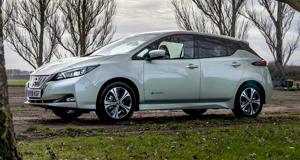September 2017
Second generation Nissan Leaf unveiled
All electric, and packed with ingenious technology, the new Nissan LEAF is the company’s first car in Europe that will embrace the early steps of advanced driver assistance, and is packed with cutting-edge innovations such as e-Pedal, allowing you to drive and brake in a totally new and seamless way.
It can also go further, with a range of 378 km/235 miles on a single charge, and has been redesigned for a new generation, with a sleeker look inside and out.
Along with enhanced energy efficiency, the new e-powertrain delivers an exhilarating, linear driving performance with a power output of 110 kW. Torque has been increased to 320 Nm, resulting in improved acceleration.
The new Nissan LEAF’s driving range has been increased to 378km/235miles (New European Driving Cycle) on a single charge. For those who want to drive their new LEAF further, Nissan will introduce a high-power version with increased motor power and battery capacity at a higher price at the end of 2018. This version will provide an even longer range, giving customers a range choice depending on their driving needs.
The new Nissan LEAF features three main new intelligent driving technologies. The first is ProPILOT advanced driver assistance system. Used during single-lane driving on the highway, it makes the drive easier, less stressful and more relaxing.
The second, ProPILOT Park, will change the way people think about parking. When activated, this technology will take control of all steering, acceleration, braking and gear selection to automatically guide the car into a parking spot. It makes parking stress free and more precise for all drivers.
The third, e-Pedal, is a revolutionary technology that transforms the way we drive. It allows drivers to start, accelerate, decelerate and stop simply by adjusting their input upon the accelerator pedal. When the accelerator is fully released, regenerative and friction brakes are applied automatically, gradually bringing the car to a complete stop.
|
Exterior
|
(mm)
|
|
Overall length
|
4,480
|
|
Overall width
|
1,790
|
|
Overall height
|
1,535/1545
|
|
Wheelbase
|
2,700
|
|
Track width front/rear
|
1,540/1,555
|
|
Minimum ground clearance
|
150
|
|
Coefficient of drag (Cd)
|
0.28
|
|
Tires
|
205/55R16 or 215/50R17
|
|
Weights/capacity
|
(kg)
|
|
Curb weight (min)
|
1,535
|
|
Capacity
|
5 passenger
|
|
Gross vehicle weight
|
1,765-1,795
|
|
Battery
|
|
|
Type
|
Li-ion battery
|
|
Capacity
|
40kWh
|
|
Electric motor
|
|
|
Name
|
EM57
|
|
Maximum output
|
110kw(150ps)/3283~9795rpm
|
|
Maximum torque
|
320N・m(32.6kgf・m)/0~3283rpm
|
|
Performance
|
|
|
Cruising range
|
378km/235miles NEDC)
|
|
Charging time (normal charging)
|
16 hours(3kW)
8 hours(6kW)
|
|
Charging time up to 80% (Quick Charging)
|
40 minutes
|
|
Maximum speed
|
144km/h / 90mph
|
January 2018
Prices for Leaf announced
Entry-grade Visia models are available from just £21,990 (including £4,500 Government Grant), rising to £33,655 (also including Govt. Grant) for range-topping fully equipped Tekna grade versions.
- Visia – From £21,990
- Acenta – From £24,290
- N-Connecta – From £25,990
- Zero (Special Version – From £26,490)
- Tekna – From £27,490
Limited to just 1,500 models, the New LEAF 2.ZERO special version is positioned between N-Connecta and the range-topping Tekna grade, and is available in two colours: Spring Cloud and Pearl Black. Specification includes:
- ProPILOT
- ePedal
- stylish 17” alloy wheels
- front and rear heated black suede-effect bio-fabric seats
- heated steering wheel
- NissanConnect EV 7” touchscreen infotainment with six speaker sound system
- Intelligent Around View Monitor with Moving Object Detection and Intelligent Driver alertness
The additional features installed on 2.ZERO versions represent a £535 saving against N-Connecta models if they were specified separately.
June 2019
Nissan LEAF e+ launched
The new range-topping MY19 Nissan LEAF e+ has been launched, offering 217PS of performance and up to 239 miles of zero-emissions driving.
Prices for the new range-topping Nissan LEAF e+ Tekna start from £35,895, including the £3,500 Government Grant.
With the Nissan LEAF e+, the newly-developed 62kWh battery pack offers 55% more capacity and approximately 25% improvement in energy density while retaining a similar shape and size to the 40kWh LEAF battery pack; all without compromising the vehicle’s exterior design and interior space. Other than a 5-millimetre increase in the car’s overall height (based on 16-inch wheels), the car’s dimensions are unchanged.
This has given the LEAF e+ a significantly increased driving range of up to 239 miles (WLTP combined mode) on a single battery charge. Maximum power output and torque have been also improved to an impressive 217PS and 340 Nm, respectively, delivering more powerful acceleration performance.
With the more powerful motor, acceleration from 50mph to 75mph is nearly 13% quicker. This allows the LEAF e+ to confidently pass slower-moving vehicles, exit corners faster and merge seamlessly with fast-moving traffic. The top speed (98 mph) has also increased from the 40kWh version by approximately 10%.
While the previous battery pack modules composed of eight laminated-structure cells, the new Nissan LEAF e+ uses a new battery module design that allows for cell modules to vary in number. The new battery module uses an innovative laser welding technique on the cell joints to reduce the overall length of the module. At the same time, by changing the number of lamination layers of the cell, an optimal module height that matches the shape of the vehicle can be achieved.
The combination of these technologies has made it possible achieve high energy density efficiently inside the battery pack.
All new LEAF versions come as standard with Nissan’s new NissanConnect infotainment system, with larger 8” touchscreen.
Features include Apple CarPlay and AndroidAuto allowing for seamless smartphone connectivity. Customers also benefit from an upgraded navigation system, which features TomTom LIVE premium traffic and route optimisation, as well as the inbuilt Online Map Update facility and Chargers Location functionality.
An all-new NissanConnect Services app comes as well with the new LEAF versions. With the app, users can send navigation routes from their smartphone to their car and from their car to their smartphones through the Door-to-Door Navigation facility, enabling an easier transition from navigation, to parking, and to final destination.
The Remote Climate Control functionality lets users pre-set air conditioning or heating while their LEAF is still plugged to the charging point, whilst information and analysis on trips and driving style can also be accessed from a smartphone.
The new LEAF also offers a number of different design options, with a total of 10 body colours and seven two-tone body and roof colour combinations allowing owners to give their LEAF a bold visual presence.
The LEAF e+ is also equipped with ProPILOT advanced driving assistance technology as standard. ProPILOT is an advanced driving assistance technology which works on single-lane highways. A ‘hands-on, eyes-on’ system, it allows the car to stop, restart and stay centred in its lane in higher-speed cruising and lower-speed congested traffic scenarios. The technology reduces driving stress and fatigue, enhancing driver confidence behind the wheel.
LEAF e+ Technical Specifications:
|
Battery capacity
|
62kWh
|
|
Max. torque
|
340 Nm
|
|
Max. engine power
|
217 PS
|
|
Acceleration (0 - 62 mph)
|
6.9 sec
|
|
Max. speed
|
98 mph
|
|
Kerb weight
|
min/max: 1709/1726kg
|
|
Luggage capacity (boot)
|
405-litres
|
|
Range (WLTP combined cycle)
|
Up to 239 miles
|
|
CO2 emissions whilst driving
|
0g/km
|
|
On-board charger
|
6.6kW
|
|
Port for rapid charger (CHAdeMO type)
|
50kW / 100kW compatibility
|
|
Battery Charging (6.6kW on-board charger, 32A wall box) from alert to 100%
|
11.3 hours
|
|
Battery Charging (50kW Rapid Charger) from 20% to 80%
|
Around 90minutes*
|
February 2020
Nissan Leaf N-Tec limited edition announced
Priced at £32,795 (including the £3,500 Government Grant) the Leaf e+ N-TEC creates a new accessible price point for the higher 62kWh capacity battery drivetrain. Launched in summer 2019, the e+ version of Leaf delivers 217PS of power, 340Nm of torque and up to 239 miles of range (WLTP combined) on a single charge.
The Leaf e+ was previously available as a range-topping Tekna version. The new N-TEC edition, limited to just 1000 examples, is based on the N-Connecta grade of the 40kWh line-up, but with added technology and styling, complementing the higher capacity 62kWh battery.
The N-TEC specification adds:
- LED Pack and LED fog lights with cornering function (usually £495 option)
- ProPILOT with Lane Keep Assist & Traffic Jam Pilot (usually £595 option)
- Electronic Parking Brake
- Metallic Blue Front Splitter
- Revised e+ suspension set-up
October 2020
Nissan Leaf updated and given price cut
The Nissan Leaf has been updated for 2020, including a new entry-grade 62kWh model and lower pricing for the range-topping Tekna e+.
With production starting from 16 th November, specification enhancements to both 40kWh and 62kWh versions include the introduction of an Intelligent Rearview Mirror on Tekna models, shark fin antenna as standard from N-Connecta, Blindspot Intervention on all grades, and the addition of telescopic adjustment on the steering wheel.
The introduction of the e+ N-Connecta to the LEAF range also creates a new entry-grade for 62kWh battery capacity models. LEAF e+ N-Connecta versions start from £32,695, including the £3000 Government Grant.
This new 62kWh grade matches the specification offered on N-Connecta 40kWh while benefiting from a higher capacity battery, delivering 239 miles of range (WLTP), up to 217PS power, 340Nm of torque and a 0-62mph time of 6.9 seconds.
Meanwhile the price of the range-topping e+ Tekna 62kWh has been reduced by £1,685 to £34,710. Leaf Acenta and N-Connecta 40kWh and LEAF N-TEC 62kWh see no price changes, with only Tekna 40kWh versions receiving a price adjustment of £315 to include Nissan’s Intelligent Rearview Mirror as standard.
ProPILOT , Nissan’s advanced Driver Assistance technology, and ProPILOT Parking Assist option packs also benefit from a price reduction. ProPILOT is now £145 cheaper on N-Connecta versions at £450, whilst ProPILOT Parking Assist is £295 less, available for £795 on Tekna grades. More than half of Leafs sold have been equipped with ProPILOT.
|
MODEL
|
OTR PRICE (INC. GOVT. GRANT)
|
FEATURES & OPTIONS
|
|
LEAF Acenta
|
£26,845
|
· Entry level version
· 40kWh battery – 168 miles (WLTP)
|
|
LEAF N-Connecta
|
£28,145
|
· 40kWh battery – 168 miles (WLTP)
· Intelligent Around View Monitor
· ProPILOT £450 cost option
|
|
LEAF Tekna
|
£30,160
|
· High spec version
· 40kWh battery – 168 miles (WLTP)
· BOSE Premium Audio System with 7 Speakers
· ProPILOT as standard
|
|
LEAF e+ N-Connecta
|
£32,695
|
· Entry level e+ grade
· 62kWh battery – 239 miles (WLTP)
· Up to 217PS, 340Nm of torgue & 0-62mph of 6.9 seconds
· ProPILOT £450 cost option
|
|
LEAF e+ N-TEC
|
£33,295
|
· Limited Edition e+ grade
· 62kWh battery – 239 miles (WLTP)
· LED Headlights
· ProPILOT as standard
|
|
LEAF e+ Tekna
|
£34,710
|
· Halo e+ grade
· 62kWh battery – 239 miles (WLTP)
· LED Fog lights with cornering function
· Intelligent Rear View Mirror
· ProPILOT as standard
|
February 2021
Nissan Leaf10 special edition celebrates 10 years of the Leaf
Highlights include standard 17-inch alloy wheels and a new two-tone grey and black paint option. Limited to 400 models in the UK. Priced from £28,820.
April 2021
Nissan Leaf range receives price reduction
Nissan has confirmed price reductions of both 40kWh and 62kWh versions of its Leaf electric vehicle, effective from April.
As a result, all grades of Leaf and both battery capacities (40kWh and 62kWh) are eligible for the revised Plug-In Car Grant of £2,500, which is offered on electric vehicles under £35,000 RRP.
Updated pricing for the LEAF range, including the £2,500 government grant, is in the table below. For customers looking to purchase an e+ 62kWh version, the OTR price reduction renews the model’s eligibility for the grant, unlocking a saving of £5,265 compared to purchasing at the previous OTR price without the £2,500 PICG support.
|
MODEL
|
BATTERY CAPACITY
|
NEW OTR PRICE (INC PICG)
|
OTR PRICE REDUCTION (FROM NEW MARCH 2021 PICG STRUCTURE)
|
|
LEAF Acenta
|
40kWh
|
£25,995
|
£1,350
|
|
LEAF N-Connecta
|
40kWh
|
£27,995
|
£650
|
|
LEAF 10 Special Version
|
40kWh
|
£28,670
|
£650
|
|
LEAF Tekna
|
40kWh
|
£29,995
|
£665
|
|
LEAF e+ N-Connecta
|
62kWh
|
£30,445
|
£5,250
|
|
LEAF e+ Tekna
|
62kWh
|
£32,445
|
£5,265
|
February 2022
Revised Nissan Leaf priced from £26,995
The updated Nissan Leaf receives a refreshed exterior design as well as a tried-and-tested suite of advanced driving assistance features such as ProPILOT, and infotainment technologies such as the on-board NissanConnect system.
The Leaf 2022 lands in Europe in April, building expectation as Nissan prepares for a strong product offensive with a fully electrified line-up offering after the summer.
From the wheels up, 2022 Nissan Leaf introduces intricate exterior styling refinements, enhancing the dynamism of the model’s distinctive appearance. The model also features Nissan’s new brand logo on the wheels, front grille and rear.
New 16- and 17-inch alloy wheel options bring an increased element of sportiness, with a slick black fascia enhancing their premium feel.
Customers also benefit from a refreshed line-up of exterior colours, from the sleek to the bold and energetic. Joining a range of five monotone colours and five two-tone options, two new hues are available after its success on iconic models like Qashqai and Ariya: Pearl Blue with a rich and mature tone, and Magnetic Blue that brings an enhanced sense of vibrancy to the model.
Offered with two battery options that deliver up to 239 miles (WLTP) of range in the Leaf e+, the 2022 Nissan Leaf combines an efficient electric driving experience with extensive driving assistance and connectivity technologies, infused with over 10 years of Nissan electric vehicle knowledge and innovation.
The ProPILOT technology enables the Nissan Leaf to automatically stop, start and maintain a safe distance to the vehicle in front, while the innovative e-Pedal provides the option to accelerate, decelerate and stop with only one pedal for maximum comfort on the move.
The Leaf also offers customers a suite of infotainment features within the on-board NissanConnect system, featuring Android Auto and Apple CarPlay smartphone integration.
Remote operation of features such as climate control are also available through the NissanConnect Services app (available from N-Connecta grade and above), while customers can link their LEAF to their Amazon Alexa 1 smart home device for added convenience.
The 2022 Nissan Leaf will be available to order from 1 st March 2022, with prices starting at £26,995, after the PiCG has been applied.

.jpg?width=640&height=426&rmode=crop)
.jpg?width=640&height=426&rmode=crop)
.jpg?width=640&height=426&rmode=crop)
.jpg?width=640&height=426&rmode=crop)
.jpg?width=640&height=426&rmode=crop)
.jpg?width=640&height=426&rmode=crop)
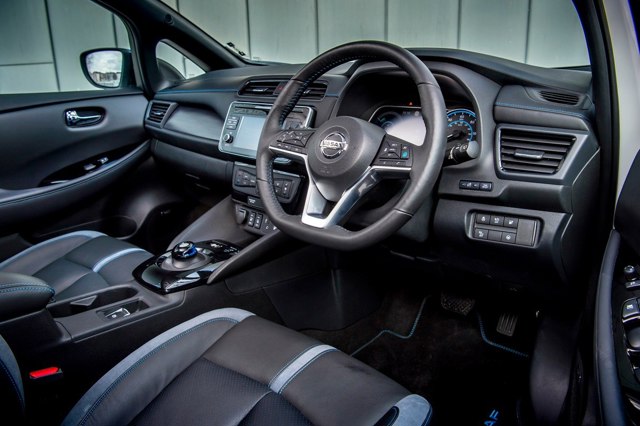


 Impressive real-world range from the Leaf E+. Fairly spacious cabin. Should be reliable. Decent value for money.
Impressive real-world range from the Leaf E+. Fairly spacious cabin. Should be reliable. Decent value for money.
 Dated infotainment. Pretty drab interior. Competition is now way ahead.
Dated infotainment. Pretty drab interior. Competition is now way ahead.
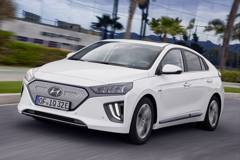

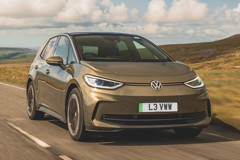

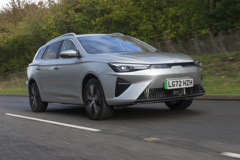





 What is your car like to live with?
What is your car like to live with?
